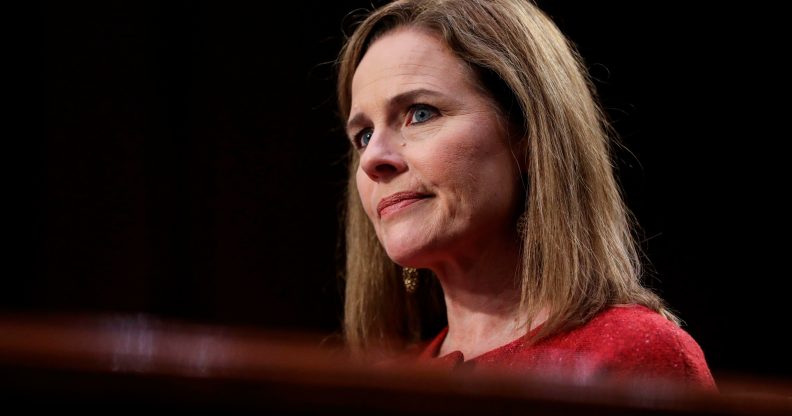Supreme Court nominee Amy Coney Barrett just used one of the oldest homophobic dogwhistles in the book

Supreme Court nominee Judge Amy Coney Barrett. (LEAH MILLIS/POOL/AFP via Getty Images)
Donald Trump’s Supreme Court nominee Amy Coney Barrett sparked outrage Tuesday (13 October) by insisting she has never discriminated against LGBT+ people based on “sexual preference”.
You know, that vastly dated term long criticised by LGBT+ people as being a discriminatory dogwhistle?
On the second day of her confirmation hearing, the 48-year-old gave vastly airy answers as she was grilled on the potential league changes that may result from her being sworn in as a justice – chiefly, marriage equality and abortion access.
In refusing to say whether marriage equality is a constitutionally protected right, she falsely claimed: “I have never discriminated on the basis on the basis of sexual preference and would never discriminate on the basis of sexual preference.”
Unsurprising, her critics say. Rooted in faith, Barrett’s judicial voting record is one that is sturdily conservative and, the Human Rights Campaign said, “demonstrates hostility toward LGBT+ rights”.
But it was her use of the outdated phrase that suggests being queer is a “choice” that managed to capture the nauseating unease held by LGBT+ Americans over Barrett’s nomination.
‘Sexual preference’, a term flinching with homophobia, say top LGBT+ rights groups.
“The term ‘sexual preference’ is typically used to suggest that being lesbian, gay or bisexual is a choice and therefore can and should be ‘cured’,” according to GLAAD.
“Sexual orientation is the accurate description of an individual’s enduring physical, romantic and/or emotional attraction to members of the same and/or opposite sex and is inclusive of lesbians, gay men, bisexuals, as well as straight men and women.”
Much of the anger and alarm felt over Barrett constellated around her use of “sexual preference” during her lofty reply, drawing criticism on Twitter from top LGBT+ rights groups as well as community leaders.
ACB using the phrase "sexual preference" is telling on herself.
— Anthony Michael Kreis (@AnthonyMKreis) October 13, 2020
It’s not a sexual “preference,” Judge Barrett. A preference is something you choose. I’ll give you and example: “I have a preference for non-radical, non-fundamentalist justices on the Supreme Court.” Are we clear?— George Takei (@GeorgeTakei) October 13, 2020
I know the phrase “sexual preference” was common in the old days, but LGBTQ people almost never use it today, for good reason: It suggests sexuality is a “preference” that can be changed. Today it’s more often used by anti-gay activists.
I am alarmed that Barrett said it.— Mark Joseph Stern (@mjs_DC) October 13, 2020
"Sexual preference," a term used by Justice Barrett, is offensive and outdated. The term implies sexuality is a choice. It is not. News organizations should not repeat Justice Barrett's words without providing that important context.— Kyle Griffin (@kylegriffin1) October 13, 2020
The correct term is sexual orientation. "Sexual preference" is a term often used by anti-LGBTQ activists to imply that sexual orientation is a choice. https://t.co/rT6g95gsG1
— GLAAD (@glaad) October 13, 2020
IMPORTANT:
Barrett used "sexual preference" (not "sexual orientation") when discussing her views on marriage equality.
This is a dogwhistle. The term "sexual preference" is used by opponents of equality to suggest that being #LGBTQ is a choice.#BlockBarrett #SCOTUSHearing pic.twitter.com/kkftq9l2l5— Lambda Legal (@LambdaLegal) October 13, 2020
Amy Coney Barrett, with her unbending values, may become a feared court powerhouse.
Indeed, Barrett has pledged to decide her cases in the mould of the late justice Antonin Scalia, a giant of right-wing jurisprudence for whom she worked under as a clerk in the late 1990s.
Scalia dissented against every single pro-LGBT+ ruling during his time on the court, from the decriminalisation of homosexuality to the introduction of same-sex marriage.
Nevertheless, Barrett sought to evade the barbs dealt by Democratic committee member Dianne Feinstein by refusing to say whether she agreed with his assessment that “the US constitution does not afford gay people the fundamental right to marry”.
As much as public polls show a heaving support for marriage equality, Barrett’s apparent scepticism may tilt the fragile 5-4 consensus and overturn the 2015 court ruling establishing the national right to it.
Barrett, with her three-pronged name and her handbook of religious values, has come to be seen by her critics as the antithesis of the late liberal stalwart Ruth Bader Ginsburg.

